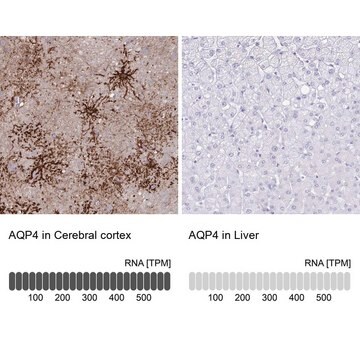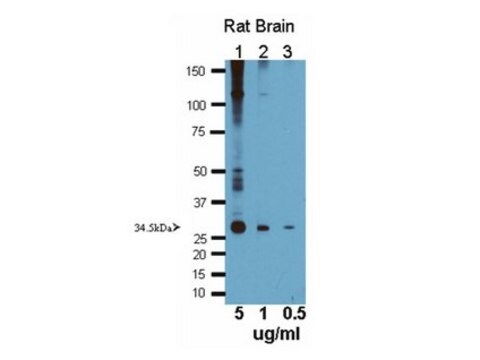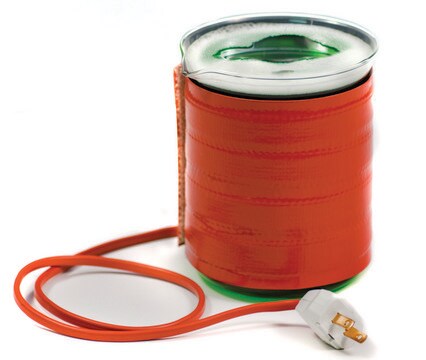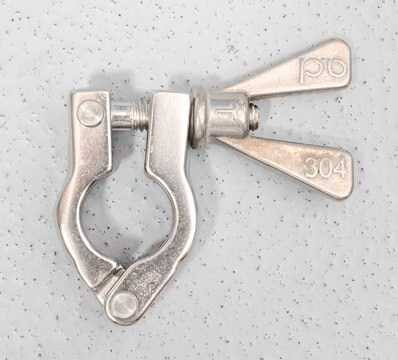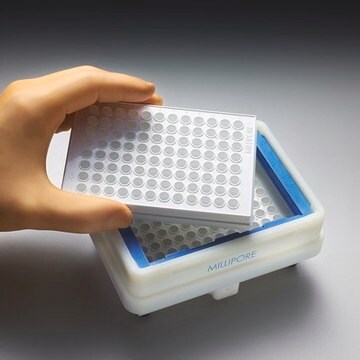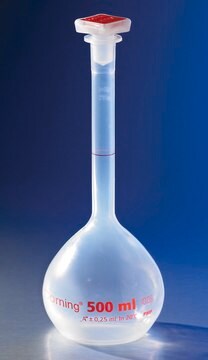MABN2526
Anti-Aquaporin 4 Antibody
About This Item
Produits recommandés
Source biologique
mouse
Niveau de qualité
Conjugué
unconjugated
Forme d'anticorps
purified antibody
Type de produit anticorps
primary antibodies
Clone
E5415B, monoclonal
Poids mol.
calculated mol wt 34.44 kDa
observed mol wt ~45 kDa
Espèces réactives
mouse
Conditionnement
antibody small pack of 100 μg
Technique(s)
ELISA: suitable
activity assay: suitable
immunocytochemistry: suitable
immunofluorescence: suitable
western blot: suitable
Isotype
IgG2aκ
Numéro d'accès UniProt
Conditions d'expédition
dry ice
Température de stockage
-10 to -25°C
Modification post-traductionnelle de la cible
unmodified
Informations sur le gène
mouse ... Aqp4(11829)
Description générale
Spécificité
Immunogène
Application
Evaluated by Western Blotting in Mouse heart tissue lysate.
Western Blotting Analysis: A 1:500 dilution of this antibody detected Aquaporin 4 in Mouse heart tissue lysate.
Tested Applications
ELISA Analysis: A representative lot detected Aquaporin 4 in ELISA applications (Huang, P, et. al. (2016). Biochem Biophys Rep. 7:77-83).
Western Blotting Analysis: A representative lot detected Aquaporin 4 in Western Blotting applications (Huang, P, et. al. (2016). Biochem Biophys Rep. 7:77-83).
Immunocytochemistry Analysis: A 1:25 dilution from a representative lot detected Aquaporin 4 in mouse astrocytes.
Function Analysis: A representative lot reduced endogenous Aquaporin-4 in primary cultured astrocytes. (Huang, P, et. al. (2016). Biochem Biophys Rep. 7:77-83).
Immunofluorescence Analysis: A representative lot detected Aquaporin 4 in Immunofluorescence applications (Huang, P, et. al. (2016). Biochem Biophys Rep. 7:77-83).
Note: Actual optimal working dilutions must be determined by end user as specimens, and experimental conditions may vary with the end user
Forme physique
Stockage et stabilité
Autres remarques
Clause de non-responsabilité
Vous ne trouvez pas le bon produit ?
Essayez notre Outil de sélection de produits.
Code de la classe de stockage
12 - Non Combustible Liquids
Classe de danger pour l'eau (WGK)
WGK 2
Point d'éclair (°F)
Not applicable
Point d'éclair (°C)
Not applicable
Certificats d'analyse (COA)
Recherchez un Certificats d'analyse (COA) en saisissant le numéro de lot du produit. Les numéros de lot figurent sur l'étiquette du produit après les mots "Lot" ou "Batch".
Déjà en possession de ce produit ?
Retrouvez la documentation relative aux produits que vous avez récemment achetés dans la Bibliothèque de documents.
Notre équipe de scientifiques dispose d'une expérience dans tous les secteurs de la recherche, notamment en sciences de la vie, science des matériaux, synthèse chimique, chromatographie, analyse et dans de nombreux autres domaines..
Contacter notre Service technique

